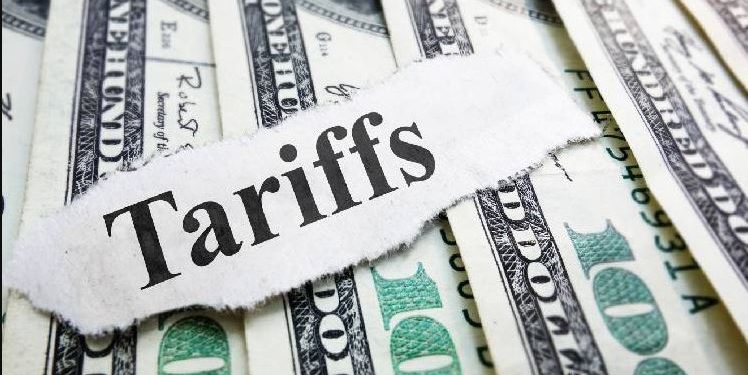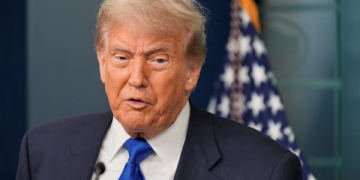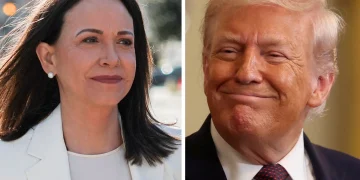Washington: Tariffs are in the news at the moment. Here’s what they are and what you need to know about them:
Tariffs are a tax on imports
Tariffs are typically charged as a percentage of the price a buyer pays a foreign seller. In the United States, tariffs are collected by Customs and Border Protection agents at 328 ports of entry across the country.
US tariff rates vary: They are generally 2.5 per cent on passenger cars, for instance, and 6 per cent on golf shoes.
Tariffs can be lower for countries with which the United States has trade agreements. Before the US began imposing 25 per cent tariffs on good from Canada and Mexico as of Tuesday, most goods moved between the United States and those countries tariff-free because of President Donald Trump’s US-Mexico-Canada trade agreement.
Mainstream economists are generally sceptical about tariffs, considering them an inefficient way for governments to raise revenue.
There’s much misinformation about who actually pays tariffs
Trump is a proponent of tariffs, insisting that they are paid for by foreign countries.
In fact, it is importers — American companies — that pay tariffs, and the money goes to the US Treasury. Those companies typically pass their higher costs on to their customers in the form of higher prices. That’s why economists say consumers usually end up footing the bill for tariffs.
Still, tariffs can hurt foreign countries by making their products pricier and harder to sell abroad.
Foreign companies might have to cut prices — and sacrifice profits — to offset the tariffs and try to maintain their market share in the United States.
Yang Zhou, an economist at Shanghai’s Fudan University, concluded in a study that Trump’s tariffs on Chinese goods inflicted more than three times as much damage to the Chinese economy as they did to the US economy.
What has Trump said about tariffs?
Trump has said tariffs will create more factory jobs, shrink the federal deficit, lower food prices and allow the government to subsidize childcare.
“Tariffs are the greatest thing ever invented,’ Trump said at a rally in Flint, Michigan, during his presidential campaign.
During his first term, Trump imposed tariffs with a flourish — targeting imported solar panels, steel, aluminum and pretty much everything from China.
“Tariff Man,” he called himself.
Trump is moving ahead with higher tariffs in his second term.
The United States in recent years has gradually retreated from its post-World War II role of promoting global free trade and lower tariffs. That’s generally a response to the loss of US manufacturing jobs, widely attributed to unfettered tree trade and and China’s ascent as a manufacturing power.
Tariffs are intended mainly to protect domestic industries
By raising the price of imports, tariffs can protect home-grown manufacturers. They may also serve to punish foreign countries for unfair trade practices such as subsidising their exporters or dumping products at unfairly low prices.
Before the federal income tax was established in 1913, tariffs were a major revenue source for the government. From 1790 to 1860, tariffs accounted for 90 per cent of federal revenue, according to Douglas Irwin, a Dartmouth College economist who has studied the history of trade policy.
Tariffs fell out of favour as global trade grew after World War II. The government needed vastly bigger revenue streams to finance its operations.
In the fiscal year that ended September 30, the government collected around USD 80 billion in tariffs and fees, a trifle next to the USD 2.5 trillion that comes from individual income taxes and the USD 1.7 trillion from Social Security and Medicare taxes.
Still, Trump favours a budget policy that resembles what was in place in the 19th century.
Tariffs can also be used to pressure other countries on issues that may or may not be related to trade. In 2019, for example, Trump used the threat of tariffs as leverage to persuade Mexico to crack down on waves of Central American migrants crossing Mexican territory on their way to the United States.
Trump even sees tariffs as a way to prevent wars.
“I can do it with a phone call,” he said at an August rally in North Carolina.
If another country tries to start a war, he said he’d issue a threat:
“We’re going to charge you 100 per cent tariffs. And all of a sudden, the president or prime minister or dictator or whoever the hell is running the country says to me, Sir, we won’t go to war.’ ”
Economists generally consider tariffs self-defeating
Tariffs raise costs for companies and consumers that rely on imports. They’re also likely to provoke retaliation.
The European Union, for example, punched back against Trump’s tariffs on steel and aluminum by taxing US products, from bourbon to Harley-Davidson motorcycles.
Likewise, China has responded to Trump’s trade war by slapping tariffs on American goods, including soybeans and pork in a calculated drive to hurt his supporters in farm country.
A study by economists at the Massachusetts Institute of Technology, the University of Zurich, Harvard and the World Bank concluded that Trump’s tariffs failed to restore jobs to the American heartland. The tariffs “neither raised nor lowered US employment’ where they were supposed to protect jobs, the study found.
Despite Trump’s 2018 taxes on imported steel, for example, the number of jobs at US steel plants barely budged: They remained right around 140,000. By comparison, Walmart alone employs 1.6 million people in the United States.
Worse, the retaliatory taxes imposed by China and other nations on US goods had “negative employment impacts”, especially for farmers, the study found.
These retaliatory tariffs were only partly offset by billions in government aid that Trump doled out to farmers. The Trump tariffs also damaged companies that relied on targeted imports.
If Trump’s trade war fizzled as policy, though, it succeeded as politics. The study found that support for Trump and Republican congressional candidates rose in areas most exposed to the import tariffs — the industrial Midwest and manufacturing-heavy Southern states like North Carolina and Tennessee.
AP






































